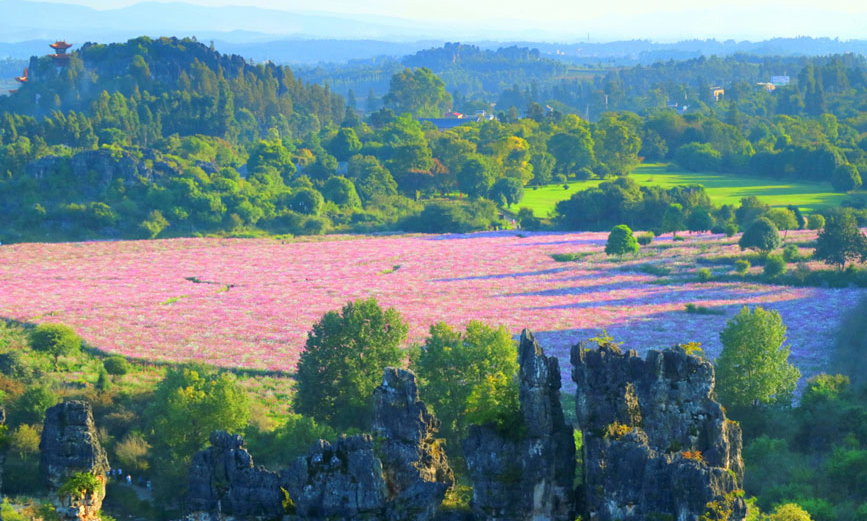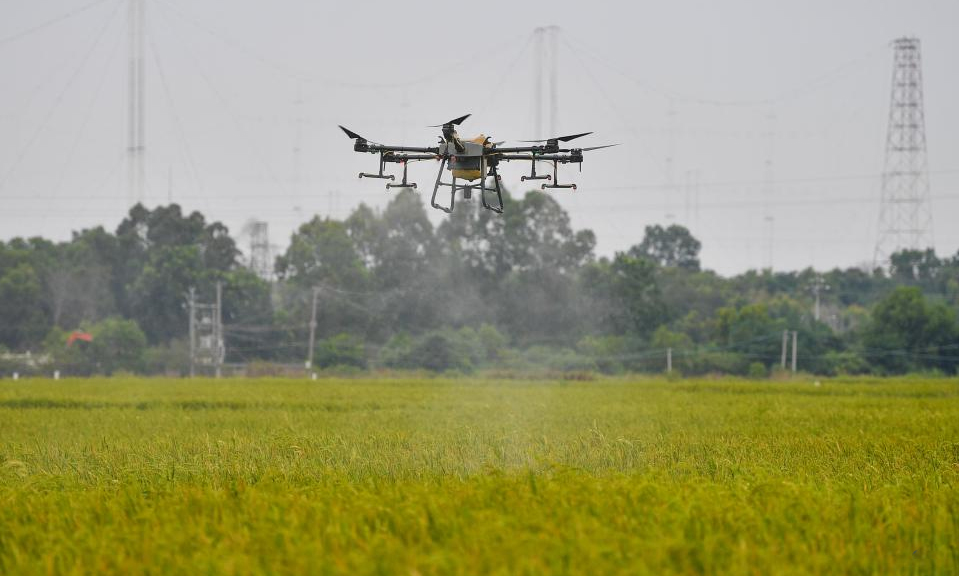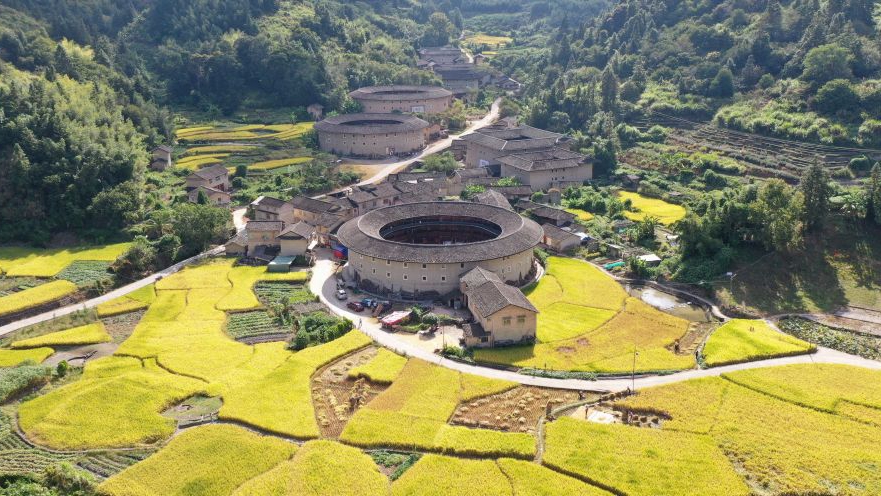Chinese, Mexican cultures to take nourishment through exchanges, mutual learning: Mexican archeologist
"It was an honor for me to be a guide for President Xi at the most important heritage site of Mexico," said Jose Huchim, director of a museum in Uxmal, an ancient Maya city of the classical period located in present-day Mexico, during a recent interview with People's Daily.
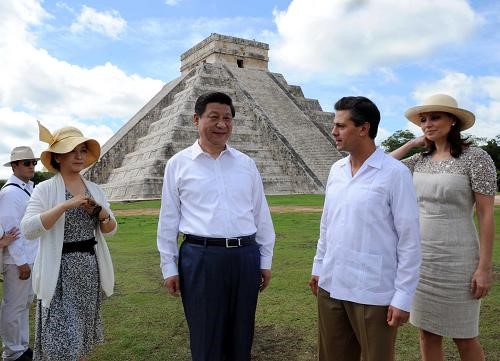
Chinese President Xi Jinping visits the ancient Mayan ruins of Chichen Itza at the invitation of then Mexican President Enrique Pena Nieto, aiming to promote the cultural exchanges between the two ancient civilizations of China and Mexico, June 6, 2013. (Xinhua/Rao Aimin)
What Huchim referred to was a visit paid by Chinese President Xi Jinping and his wife Peng Liyuan to the ancient Mayan ruins of Chichen Itza, Mexico, upon invitation from then Mexican President Enrique Pena Nieto on June 6, 2013.
"During the visit, President Xi noted that it was necessary to uphold an attitude of equality and humility to understand the essence of civilizations. His broad mind was respectable and admirable," Huchim recalled.
Chichen Itza, located some 1,400 km east of Mexico City, dates back to the 5th century AD. It had once been the most prosperous city of ancient Maya as well as an important site of the Mayan city culture at its peak. It was listed as a World Heritage site by UNESCO in 1988.
On the day of the visit, Xi was greeted by Mexican children waving Chinese and Mexican national flags and singing Mexican folk songs. Local people also greeted the Chinese guests with a ceremony in a unique way of Mayan tradition.
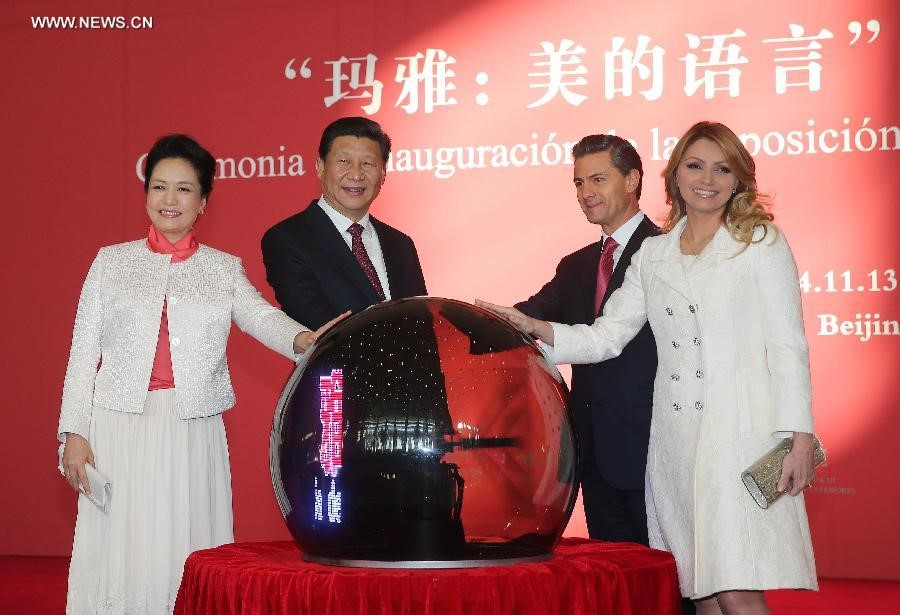
Chinese President Xi Jinping (2nd L), his wife Peng Liyuan (1st L) and Mexico's President Enrique Pena Nieto (2nd R) and his wife Angelica Rivera jointly cut the ribbon at the opening ceremony of the exhibition of "Mayas: The Language of Beauty" at the National Museum of China in Beijing, capital of China, Nov. 13, 2014. (Xinhua/Liu Weibing)
Xi toured around the Quetzalcoatl Pyramid, ball court and the temple in the archaeological site. He learned about the ruins of Chichen Itza, the influence of Maya civilization on the Mexican culture as well as the protection and recovery work of the ruins. He also discussed the history and culture of China and Mexico with Pena Nieto.
There is a spectacle in Chichen Itza. Around the Spring Equinox and the Autumn Equinox, the sun strikes off the northwest corner of the Quetzalcoatl Pyramid, which served as a temple to a feathered serpent god in Mayan mythology, and casts a series of shadows, creating the illusion of the god descending the pyramid.
On the Spring Equinox, the serpent-shaped shadow descends to the bottom of the pyramid, which symbolizes the return of the god to the earth. On the Autumn Equinox, the shadow goes up to the temple on top, which heralds the guardian of the Mayan civilization will give a harvest to the people. What's more interesting is that the two shadow movements last for exactly the same time.
"When I explained this phenomenon to President Xi, he was listening very carefully, admiring the astronomical and architectural achievements of the Mayan civilization. It encouraged me very much," Huchim said.
Huchim, as a researcher of history and culture, is impressed by the importance attached by the Chinese leader to the protection of human civilization.
"I should thank him for his important contributions to promoting mutual learning and exchanges between civilizations," Huchim told People's Daily.
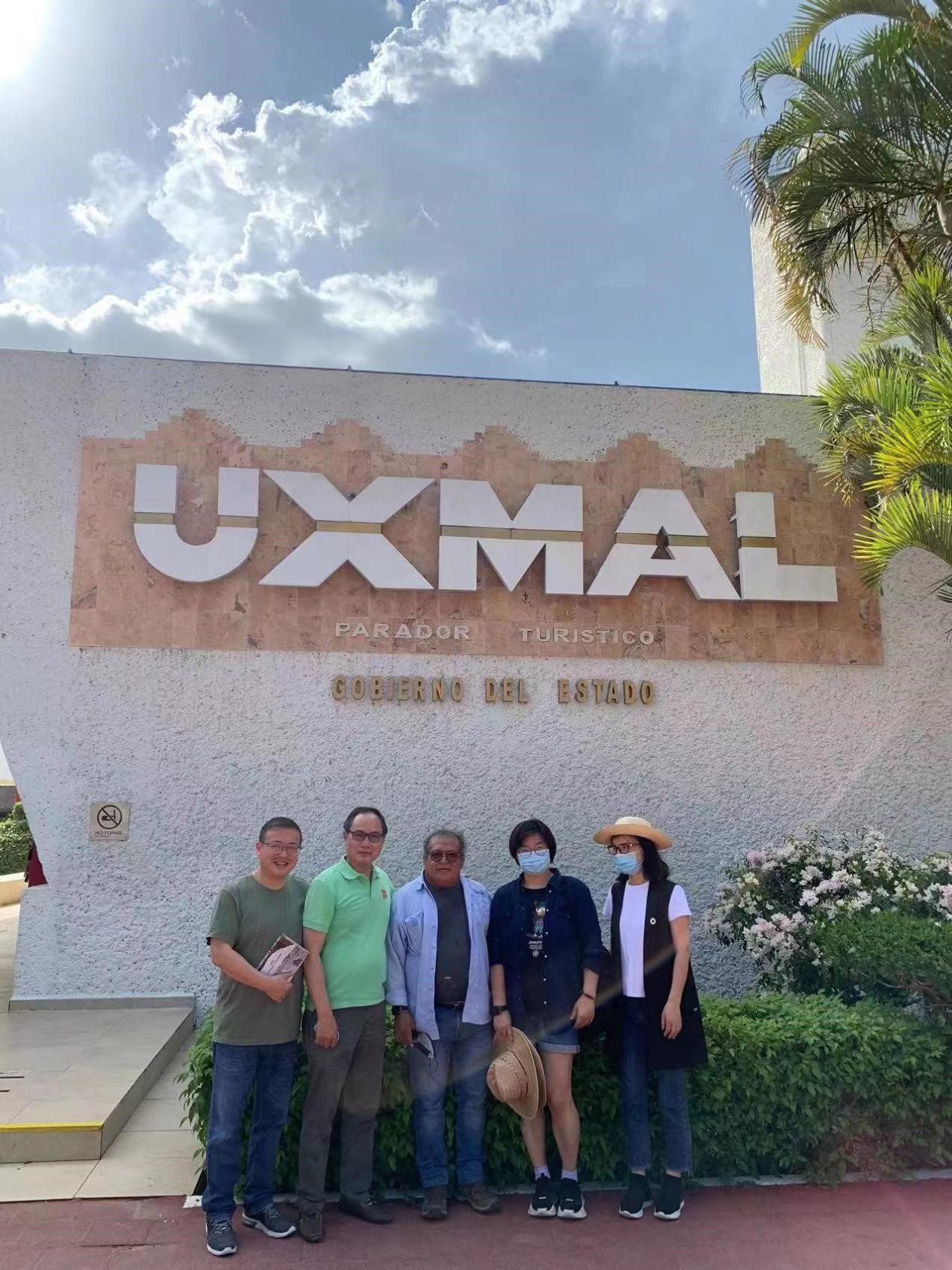
Jose Huchim (3rd L) (Photo provided by Jose Huchim)
China and Mexico are both ancient civilizations and great cultural powers. The two cultures have far-reaching influence on the world as a result of their distinctive features and manage to maintain vitality through innovations. They have learned from each other, leaving a brilliant page in the history of world civilization.
"President Xi not only has a deep understanding of the Chinese culture, but also embraces other civilizations with an open mind. He believes that there is no such thing as a superior or inferior civilization, and civilizations are different only in identity and geography. He has stressed that the diversity of human civilizations drives the progress of mankind. It exactly showcases his caring for the world," Huchim said.
Xi's visit has promoted the Chinese people's understanding of Mexican culture and made more and more Mexicans eager for Chinese culture, Huchim added.
The Exhibition of Mayas: The Language of Beauty was jointly held by the cultural departments of China and Mexico at the National Museum of China in Beijing on Nov. 13, 2014. It was the first major exhibition hosted by the museum on Central American civilizations after it reopened.
Xi and Pena Nieto, who was visiting China then, jointly attended the opening ceremony of the exhibition.
Xi noted the exhibition was a grand event of China-Mexico cultural exchanges. Exhibitions and other cultural activities would make cultural relics, historical sites and ancient books lively and revitalize the friendship between the Chinese and Mexicans.
In December 2018, Huchim was invited to an academic exchange in China with Chinese archaeologists, and visited the Sanxingdui Museum in Chengdu, southwest China's Sichuan province.
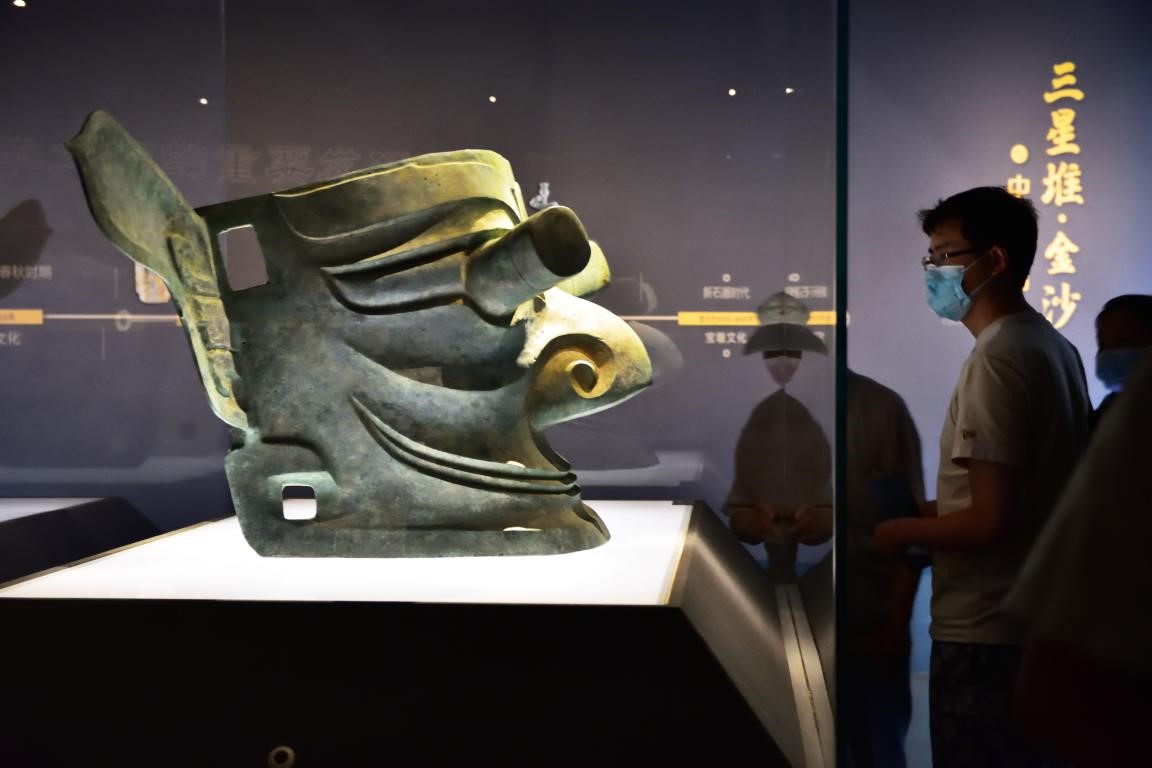
An exhibition of cultural relics unearthed at the Sanxingdui site, southwest China's Sichuan province is held at the Fengxian Museum, Shanghai, June 8, 2021. (People's Daily Online/Zhou Dongchao)
He said China, employing high technologies in the protection of cultural relics, has made remarkable achievements, which has set a good example for other countries. He believes China and Mexico enjoy broad prospects in cultural and people-to-people exchanges, as both of them boast rich cultural and historical resources.
After the 2018 visit, Huchim participated in multiple academic exchange programs held by the Sanxingdui Museum, where he discussed the protection of the ancient Shu civilization of Sichuan province and the Mayan civilization.
"Different cultures and civilizations, while retaining their uniqueness, should tolerate and coexist with each other with an open-minded attitude so as to achieve common development and prosperity," Xi said during his visit to Chichen Itza.
Huchim agrees with Xi's remarks. "China follows a vision of building a community with a shared future for mankind when it comes to civilization. Though Mexico and China are far away from each other, they enjoy a profound friendship."
"This year marks the 50th anniversary of the establishment of diplomatic ties between the two countries. We hope that the Chinese and Mexican cultures, as President Xi said, can take nourishment through exchanges and mutual learning, and grow vigorously as time goes by," he noted.
Photos
Related Stories
- Interview: Mexico-China trade cooperation fruitful, economy minister says
- Mexico celebrates 50th anniversary of diplomatic ties with China
- Mexico celebrates 50th anniversary of diplomatic ties with China
- Chinese, Mexican presidents exchange congratulations on 50th anniversary of diplomatic ties
- SW China county forges sister-city ties with city in Mexico
- China-made hi-tech rail cars bolster development, connectivity in north Mexico
- Chinese, Mexican FMs agree to lift bilateral ties to higher level
- Mexico appreciates China's cooperation in fighting COVID-19
- China-Mexico historical ties witnessed by China-made coins
- IPPA between Hong Kong, Mexico to enter into force on June 16
Copyright © 2022 People's Daily Online. All Rights Reserved.






